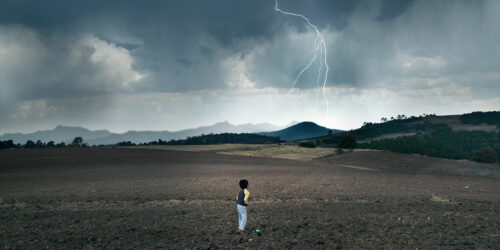The Echo
Date: Thursday August 22nd 2024
Location: TIFF Lightbox
Experience and Elements in The Echo
By Aidan Cseh
In Tatiana Huezo’s new docufictional feature El Eco, intimate moments of life in rural Mexico are presented with a subtle and purely visual energy. The events being described here are mundane in nature, but every being in the vast breadth of rural life is given close and equal attention: animals, nature, and humans are all levelled to the same plane. At the core of their existence is a constant exchange of knowledge, labour, and love. Parents pass down knowledge to their children, who reciprocate by caring for an older generation; the flow goes two ways at once. A scene of a young girl bathing her grandmother is presented without context, as a single moment in time that nevertheless feels attached to everything, a gentile emblem of care and interdependence. Although the family we follow changes with a cut, they feel connected by the simple and rich experience of elemental life where everything depends on one another.
Huezo, who was born in El Salvador, is a young veteran of the festival circuit at 52. Previously, she has directed films about the Central American drug trade and human trafficking: compared to these fraught topics, El Eco represents a change of pace. Working in an immersive and poetic style, Huezo shot her subjects—three families living and farming in Puebla—for 18 months; her methods yield an intimate feeling of connection. Formally, the film alternates smartly between sequences of calm (swaying trees seen from beneath) and an energetic kineticism, as in a passage of sheepherding: the camera is placed within the herd itself; the image vibrates from the rumble of their movement. In lieu of a single narrative, the film occupies the spaces between dramatic moments, placing the onus on the viewer to draw connections between the various episodes, and to accept the invitation to live and breathe along with the characters.
As a depiction of community, El Eco observes a clear division of labour and expectations between men and women, with the latter resigned to the domestic realm. And yet there is a stronger focus on motherly relationships than fatherly ones: the women in the film long for daughters to find happiness beyond the confines of the village, while the men guide them to remain within. Work and education are major motifs, with scenes at school juxtaposed against lessons learned and applied outside the classroom. Throughout, there is a feeling of children growing upward but not necessarily outward, towards predetermined roles that will allow them to preserve a way of life. The boundaries between love and labour become blurred; in this environment, work requires a sense of peaceful coexistence with nature, but there are limits to that solidarity. In a scene that reminded me of Jean Eustache’s visceral 1970 short Le Cochon, grandparents teach their grandchildren how to butcher a goat, punctuating the work by asking his grandson what he wants to do with his earnings. He answers that he wants to buy candy, rendering the contrast between innocence and maturity with real complexity; as in Eustache’s film, we’re shown the relationship between brutality and routine—an extraction of poetry from reality.
The viewer rests between the reality of the everyday and the poetics of the images, experiencing the world that surrounds the impressionable eyes of children as much as they do stand at a distance from it. When parents talk about their hopes for the children – whether it’s the positive affirmations of a mother or the artificial constraints of womanhood placed onto her by the father – our vantage point can not separate them and the lessons they’ve learned from the landscape that teaches. Even as we watch a young girl leaving the farm, it is the reflection of the hills and fields in the truck window that take prominence. The poetic nature that the film takes on under Huezo’s direction offers us the ability to think forth to their future in the context of the past. When the children appear on screen with their heavy-headed dreams of life outside the farm, the lessons of interchange between self-reliance and interdependence seem to materialize in the image. Poetic and cinematic observation allows the viewer to bring the deep undercurrent of emotions forth into the images, creating a mode of representation that is purely experiential.
